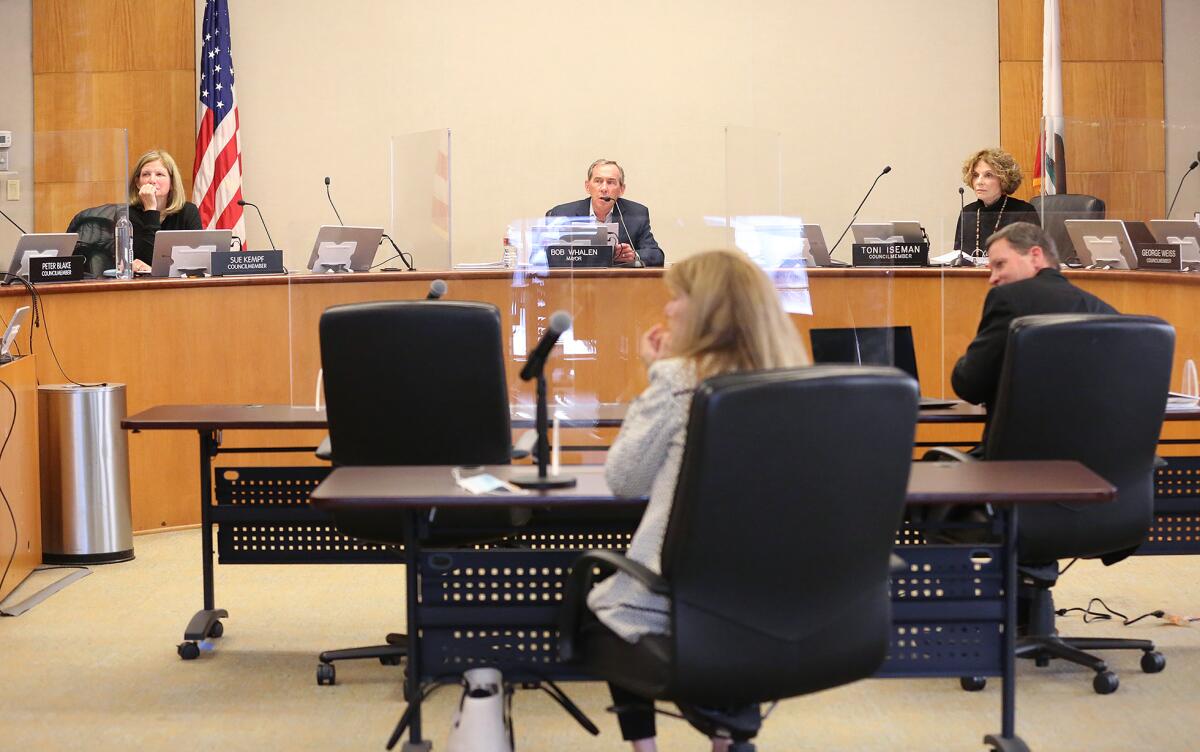Laguna Beach considers policy change for placing items on City Council agenda

- Share via
A majority of the Laguna Beach City Council this week voted to have a resolution prepared that would require a council member, city board, commission or committee to consult with the city manager if they want to request that an item be placed on a City Council meeting agenda.
Mayor Sue Kempf, who introduced the item, said the existing process has become inefficient, requiring the council and the public to have multiple discussions on initiatives, sometimes without the benefit of a staff report to provide context.
Under the new policy, once a request is brought to the city manager, staff would be assigned to prepare a report for the item, which would then go to the City Council within two or three months. Kempf contended that having research done by staff in advance of an item coming before the council would allow the panel to have a more informed discussion.
“Some of these things that we’ve been putting on the agenda, I think, would be better served by working with the city manager,” Kempf said. “[It can be] more enlightening than just bringing it forward and putting it on the agenda and having a discussion about it.”
If a staff member is unavailable to attend to the request, the item would be presented to the council, and a council majority would have the option to determine whether there was interest in pursuing the matter further.
“That was a shocker when I saw that [proposed resolution],” said Councilwoman Toni Iseman, who along with George Weiss cast the dissenting votes in the 3-2 decision. “This [matter] doesn’t go forward unless I can count to three, so there’s an early veto.”
Supporters of an agenda-setting policy change argued that the public was being inconvenienced by being asked to show up to multiple meetings to make their case before the council acted on an item.
Weiss indicated he felt his abilities as a policymaker would be negatively impacted by the new policy. He has had his name attached to a council member item for consideration at every council meeting since at least May 10, including items regarding climate change, business license fees and a ban on certain types of balloons.
“That’s an undue restriction on just getting a debate going,” Weiss said. “We’re not wasting a lot of time.”
For city boards, commissions and committees to place items on the City Council agenda, the council liaison, the chair of the body, and the staff liaison would contact the city manager to propose an initiative.
Initiatives that originate from bodies other than the planning commission, the design review board, the arts commission, the parking, traffic and circulation committee, and the view restoration committee would have to fall within the work plan approved by the council for the associated panel.
As would be the case with an item brought by a member of the council, the city manager would determine if staff resources were available to conduct analysis of an item before it was brought to council. In the event that staff resources were not allocated, council would receive a presentation and determine whether there was support for staff to return with an agenda report.
“I think this makes sense as a process because that is how we used to do it,” Mayor Pro Tem Bob Whalen said. “Try to work through the city manager, get it on the agenda within 60 to 90 days is fine. I like the idea of [initiatives] only coming once to us.”
All the latest on Orange County from Orange County.
Get our free TimesOC newsletter.
You may occasionally receive promotional content from the Daily Pilot.




